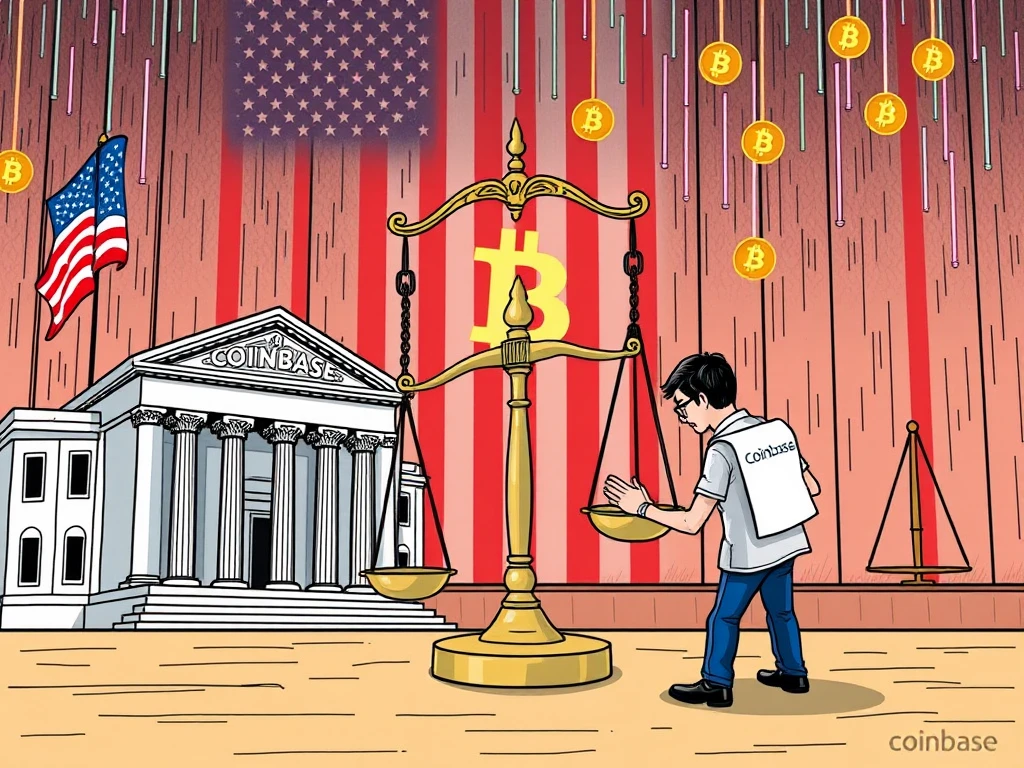Coinbase User’s Crucial Battle Against IRS Over Crypto Records Access

The digital asset world is watching closely as a significant legal challenge unfolds, pitting a Coinbase user against the might of the US government and the IRS. At the heart of the matter is access to sensitive crypto transaction data, raising fundamental questions about privacy rights in the age of digital finance.
Why the IRS Wants Your Crypto Records
This legal skirmish originated from a 2016 IRS investigation. The agency noticed a significant discrepancy: millions of users were trading cryptocurrencies like Bitcoin on platforms such as Coinbase, yet relatively few were reporting capital gains on their tax returns. To address this perceived tax underreporting, the IRS issued a ‘John Doe’ summons to Coinbase, compelling the exchange to hand over records for certain high-volume customers.
The Legal Challenge: Crypto Privacy vs. Government Access
James Harper, a Coinbase user whose records were sought, didn’t take this lying down. He sued the IRS, arguing that obtaining his transaction history from Coinbase constituted an unconstitutional search under the Fourth Amendment, which protects against unreasonable searches and seizures. His argument centers on the idea that his financial data, even held by a third party, should be considered private.
However, lower courts sided with the IRS. Their reasoning? Records held by a business like Coinbase are considered business documents, not the user’s personal private papers. They ruled the IRS followed proper legal procedures by obtaining a judicially approved summons.
The US Government’s Stance on IRS Crypto Access
The US government has now formally urged the Supreme Court to reject Harper’s appeal. In a filing dated May 30, the Solicitor General argued that Harper has no Fourth Amendment right to prevent the IRS from accessing records he voluntarily shared with Coinbase. The government’s position relies heavily on existing legal precedent, particularly cases like *United States v. Miller*.
Key points from the government’s argument include:
- Individuals have no reasonable expectation of privacy in financial records held by third parties like banks or cryptocurrency exchanges.
- By using Coinbase, Harper voluntarily shared his data with the exchange.
- The IRS used a lawful, judicially approved process (the summons) to obtain the information.
- Coinbase’s own privacy policy warned users that information could be shared with law enforcement.
The government contends that the lower courts correctly applied established law in rejecting Harper’s claims.
What This Means for Crypto Regulation and Users
This case highlights the ongoing tension between government efforts to enforce tax laws and users’ desire for privacy in the cryptocurrency space. If the Supreme Court declines to hear the case, the lower court ruling in favor of the IRS will stand. This would reinforce the government’s ability to use summonses to obtain crypto records from exchanges, treating them similarly to traditional financial institutions under existing third-party doctrine.
While this specific case focuses on past tax compliance, the outcome could influence future discussions around crypto regulation and how user data is handled by exchanges. It underscores the importance for users to understand the privacy policies of the platforms they use and their potential obligations regarding reporting crypto gains for tax purposes.
Beyond the Courtroom: Related Coinbase Events
It’s worth noting that Coinbase has faced other challenges recently. The platform disclosed a data breach in May, where attackers gained access to sensitive user information, including transaction histories, by compromising customer support staff. This event, while separate from the IRS legal challenge, adds another layer to the discussion about the security and privacy of data held by cryptocurrency exchanges.
Conclusion: Waiting for the Supreme Court’s Decision
The Supreme Court has not yet decided whether it will take up James Harper’s case. The decision on whether to hear the appeal is a critical juncture. A denial would effectively end Harper’s challenge and leave the lower court ruling intact, solidifying the government’s stance on accessing crypto records held by exchanges. The outcome will be significant for crypto privacy rights and the future of IRS crypto enforcement.







